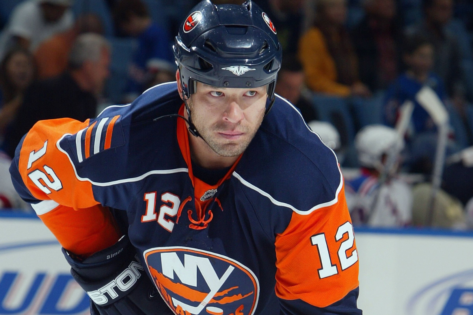On March 18, 2024, the sports community mourned the loss of Chris Simon, a former Stanley Cup champion, who tragically took his own life at the age of 52 in his hometown of Wawa. His family linked his death to the challenges he encountered as a result of CTE. In a statement, they conveyed their sorrow and emphasized the insufficient support and acknowledgment from professional hockey leagues concerning the risks of CTE and other brain injuries incurred in the sport.
Recently, the family of Chris Simon, including his parents and sister, issued a new statement. The report on the Concussion Legacy Foundation website reveals the findings of a post-mortem brain tissue analysis, highlighting the critical need for accessible medical and mental health resources for former hockey players facing the long-term consequences of repeated head impacts.
“Chris was suffering tremendously from CTE. We saw him declining but did not know where to turn to for help. Chris’ short term memory issues were ongoing for many years. We also learned that he had lost most of his hearing, had daily headaches, light sensitivity, paranoia, was easily frustrated with tasks, had extreme anxiety, difficulty navigating in a vehicle, apathy- lack of feeling and emotion, impulsivity, distancing himself from those who meant the most to him, had executive dysfunction – meaning he couldn’t plan or problem solve and he had suicidal thoughts at times,” shared the heartbroken family.
In straightforward terms, they aim to ensure that no other former hockey player endures the same hardships that Chris faced. The family faced numerous challenging moments, witnessing one of their own endure suffering, all while feeling powerless to intervene. Additionally, to shed light on this particular issue, the family expressed, “Before we lost Chris to CTE, he was a very gentle, loving man whose family meant the world to him. We know that Chris would want more than anything that former players and families now know where to turn to for help if they suspect their loved one is suffering from TBI, PCS and CTE so they can get the support they desperately need.”
Dr. Ann McKee, the chief of neuropathology for the VA Boston Healthcare System and director of the Boston University CTE Center and UNITE Brain Bank, provided an in-depth analysis regarding the late Stanley Cup champion. She stated, “Mr. Simon had severe CTE pathology in areas of the brain involved with cognition and mood regulation, and it is likely CTE contributed to his memory problems, depression, and apathy.”
Highlighting additional concerns, CLF CEO Dr. Chris Nowinski stated, “With each new diagnosis of CTE in a former NHL player, the NHL’s lack of leadership on this issue becomes more intolerable. Yet their denial strengthens our resolve to support the hockey community through our free HelpLine and advance research focused on diagnosing CTE during life and developing effective treatments.” The CEO of CLF expresses dissatisfaction with the NHL’s handling of player-related issues, emphasizing the urgency for resolution. But what was Chris Simon’s league career like?
Chris Simon’s career which he even won a Stanley Cup
Chris Simon, a Canadian professional ice hockey player, gained recognition for his aggressive style of play and his position as an enforcer in the NHL. Born on January 30, 1972, in Wawa, Ontario, Simon, of Ojibwa descent, emerged as a significant figure for First Nations hockey players in Canada. Selected 25th overall by the Philadelphia Flyers in the 1990 NHL Entry Draft, he was subsequently traded to the Quebec Nordiques before ever stepping onto the ice for the Flyers.
Simon’s NHL career extended across more than 15 seasons, featuring his time with multiple teams such as the Quebec Nordiques, Colorado Avalanche, Washington Capitals, Chicago Blackhawks, New York Rangers, Calgary Flames, New York Islanders, and Minnesota Wild. He played a crucial role on the Colorado Avalanche team that clinched the Stanley Cup in 1996.
Throughout his career, Simon gained a reputation for his intense style of play, racking up 1,824 penalty minutes and facing eight suspensions that amounted to 65 games. While he projected a fierce demeanor during games, those who knew him off the ice recalled him as a compassionate and considerate person.
The post Late Stanley Cup Champion’s Family Blame NHL and Hockey Over Tragic Loss appeared first on EssentiallySports.
